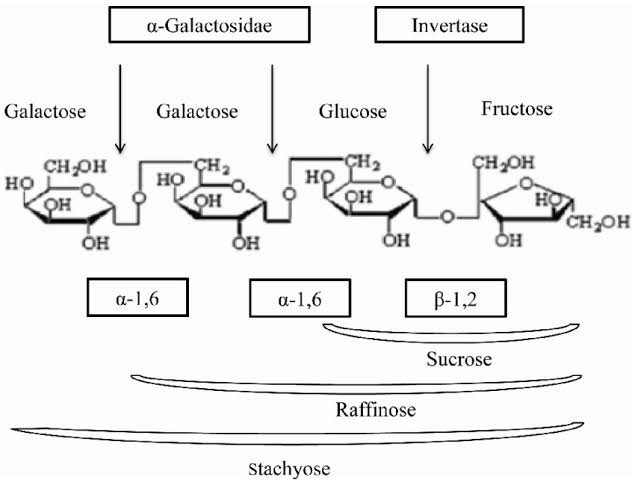คุณสมบัติของอัลฟากาแลคโตซิเดส (α-galactosidase)
348 จำนวนผู้เข้าชม |

ถั่วเหลืองจัดเป็นแหล่งโปรตีนที่ดีและเป็นที่นิยมใช้กันอย่างแพร่หลายในอาหารสุกร (García et al., 2016; Karr et al., 2005) อย่างไรก็ตาม สารต้านโภชนะในถั่วเหลืองดิบมีอิทธิพลเชิงลบหลายประการต่อสุกร โดยเฉพาะลูกสุกร (Choct et al., 2010; Friesen et al., 1993; Pluske et al., 1997) สารต้านโภชนะในถั่วเหลืองสามารถกำจัดได้โดยวิธีต่าง ๆ เช่น การใช้ความร้อน การหมัก และการเติมเอนไซม์ แต่สารต้านโภชนะที่เสถียรต่อความร้อน โดยเฉพาะโอลิโกแซ็กคาไรด์ของถั่วเหลืองจะยังคงมีอยู่ (Ruiz et al., 2020) ซึ่งมีรายงานว่าโอลิโกแซ็กคาไรด์จากถั่วเหลืองจะส่งผลไม่ดีหากใช้ถั่วเหลืองในสูตรมากถึง 10% (Macrae et al., 1993) อีกวิธีหนึ่งในการกำจัดโอลิโกแซ็กคาไรด์จากถั่วเหลืองที่ใช้ในอุตสาหกรรมคือการสกัดแอลกอฮอล์หรือเอทานอล ซึ่งท้ายที่สุดแล้วจะทำให้ต้นทุนอาหารสัตว์เพิ่มขึ้นอย่างมาก (Ruiz et al., 2020) งานวิจัยก่อนหน้านี้รายงานว่า โอลิโกแซ็กคาไรด์จากถั่วเหลืองจะลดการย่อยได้และการใช้ประโยชน์ได้ของโปรตีน คาร์โบไฮเดรต และไขมันในวัตถุดิบอาหาร ทำให้เกิดอาการท้องอืดในสุกร ทำให้การเจริญเติบโตลดลง ทำให้อัตราการให้ผลผลิตลดลง ทำให้อัตราการตายเพิ่มขึ้น เป็นต้น (Smiricky et al., 2002, 2003) โอลิโกแซ็กคาไรด์จากถั่วเหลืองส่วนใหญ่ประกอบด้วยราฟฟิโนส สตาคิโอส และซูโครส (Macrae et al., 1993) จางและคณะ (2003) แสดงให้เห็นว่าการเติมสตาคิโอส 1% และ 2% มีผลเสียต่อประสิทธิภาพการเจริญเติบโตของลูกสุกร
นอกจากนี้ยังมีงานวิจัยพบว่า ราฟฟิโนสจากถั่วเหลืองจะยับยั้งการกินอาหารโดยสมัครใจ การย่อยได้ของสารอาหาร และกระตุ้นการตอบสนองทางภูมิคุ้มกันของร่างกาย ซึ่งท้ายที่สุดจะลดการเจริญเติบโตของสุกรที่กำลังเติบโต (Z.Zeng, Y. Zhang, J.He et al., 2021)
เอกสารอ้างอิง
Choct M, Dersjant Y, McLeish J, Peisker M. Soy oligosaccharides and soluble nonstarch polysaccharides: a review of digestion, nutritive and anti-nutritive effects in pigs and poultry. Asian Austral J Anim 2010; 23:1386-98.
García P, C_amara L, L_azaro R, Dapoza C, P_erez R, Mateos G. Influence of the origin of the beans on the chemical composition and nutritive value of commercial soybean meals. Anim Feed Sci Technol 2016; 221:245-61.
Karr L, Kadzere C, Grieshop C, Fahey JG. Chemical and nutritional properties of soybean carbohydrates as related to nonruminants: a review. Livest Prod Sci 2005; 97:1-12.
Macrae R, Robinson RK, Sadler MJ. Encyclopedia of food science, food technology and nutrition. London: Academic Press; 1993.
Ruiz N, Parsons CM, Stein HH, Coon CN, Eys JE, Miles RD. A review: 100 years of soybean meal. ADM 2020.
Smiricky M, Grieshop C, Albin D,Wubben J, Gabert V, Fahey JG. The influence of soy oligosaccharides on apparent and true ileal amino acid digestibilities and fecal consistency in growing pigs. J Anim Sci 2002; 80:2433-41.
Smiricky M, Grieshop C, Flickinger E, Bauer L, Fahey JG. Dietary galactooligosaccharides affect ileal and total-tract nutrient digestibility, ileal and fecal bacterial concentrations, and ileal fermentative characteristics of growing pigs. J Anim Sci 2003; 81:2535-45.
Zeng Z., Zhang Y., He J., et al. Effects of soybean raffinose on growth performance, digestibility, humoral immunity and intestinal morphology of growing pigs. Anim Nutr 2021; 7:393-399. Download from https://www.sciencedirect.com/science/ article/pii/S2405654521000330
Zhang L, Li D, Qiao S, Johnson E, Li B, Thacker P, et al. Effects of stachyose on performance, diarrhea incidence and intestinal bacteria in weanling pigs. Arch Anim Nutr 2003; 57:1-10.



